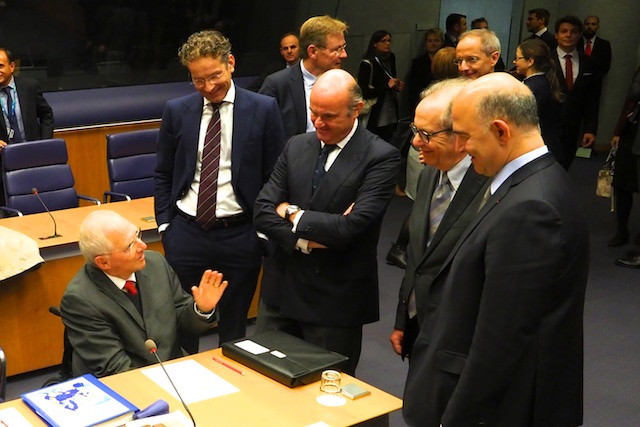Berlin put forward a plan on overhauling the European Stability Mechanism during the Eurogroup meeting of euro zone finance ministers in Luxembourg on Monday, Reuters said.
Die Welt said that the outgoing German finance minister, Wolfgang Schäuble, had presented a “non-paper”. The proposal would imply giving the ESM more rights, more employees and more funds.
According to the Reuters article published on 9 October, the agency should be transformed into a “European Monetary Fund” of sorts:
“Unlike the International Monetary Fund, which is also the lender of last resort for governments around the world, the ESM does not have policy-monitoring powers before a government is cut off from market borrowing and asks for a rescue programme.
“‘It is therefore important to expand the ESM’s radar and give it a stronger role in terms of monitoring country risks,’ the German non-paper, seen by Reuters, said.
“‘The aim is to identify, in cooperation with other institutions, stability risks for and in Eurozone member states more effectively and at an earlier stage than in the past, and to monitor these risks so that they can be reduced by the affected countries themselves.’”
At the same time, the German paper argued that the ESM should not guarantee the planned European Deposit Insurance Scheme nor the possible euro zone-wide budget currently being debated.
The ESM, which is based in Kirchberg and employs around 170 staff, bails out euro area governments facing financial crisis, including Greece, Cyprus and Spain. Although it is owned and backed by member states, it raises rescue funds in the global capital markets.
UPDATE, 10 October, 3:30pm:
The European Parliament’s Greens/EFA group has criticised Wolfgang Schäuble’s “non-paper”.
In a statement issued on Tuesday afternoon, Sven Giegold, who is the bloc’s spokesman for economic and financial affairs, said:
“Schäuble has presented a poisonous gift for European democracy. The EU institutions will be weakened if competences are transferred to a future European Monetary Fund under the sole control of national governments. Pragmatism must not trump democracy. Schäuble’s plans lack courage and vision for Europe. It will not help Europe if a eurozone budget is only given pocket money and with the sole intention of achieving structural reform.”
Giegold also published the non-paper on this website (PDF).
UPDATE, 10 September, 5pm:
France’s European commissioner, Pierre Moscovici, has issued a firm rebuttal to Schäuble’s non-paper.
Moscovici, the commissioner in charge of financial affairs, said in a speech on Monday evening following the Eurogroup meeting:
“First of all, this discussion cannot take place in isolation. It is part of a broader debate on the future of the euro area and any decision on the ESM will have to be coherent with the other conclusions of this debate.
“Secondly, we must bear in mind that the member states have already given the commission authority for economic and budgetary coordination and monitoring, in the European treaties and in legislation. Any decision on the future of the ESM should therefore respect this authority and avoid creating institutional confusion and duplication of roles.
“And thirdly, increased authority must be accompanied by more democratic responsibility, more accountability. Our citizens are expecting it and I understand them. It is for this reason that the commission believes that the place of the ESM is within the community framework--in the interests of the efficiency, coherence, legitimacy of the euro area and the union as a whole, as we saw in president Juncker’s speech on the state of the European Union.”
